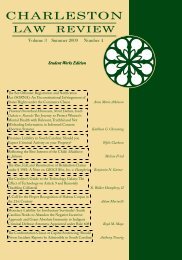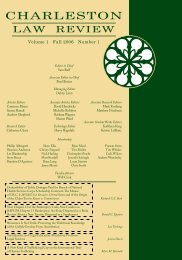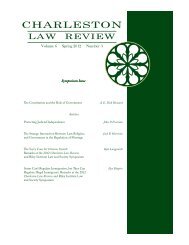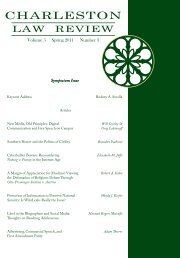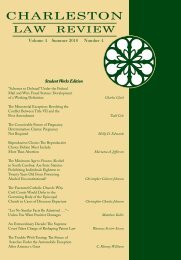Volume 5 Winter 2011 Number 2 - Charleston Law Review
Volume 5 Winter 2011 Number 2 - Charleston Law Review
Volume 5 Winter 2011 Number 2 - Charleston Law Review
Create successful ePaper yourself
Turn your PDF publications into a flip-book with our unique Google optimized e-Paper software.
SCHULZE FINAL.doc1/20/<strong>2011</strong> 6:14PMCHARLESTON LAW REVIEW [<strong>Volume</strong> 51. Humanizing Tenet <strong>Number</strong> One: “Do No Harm”Under the principle of “do no harm,” many commentatorsanalyze how the negative side of competition in law schoolscreates psychological harm. 132 Mandatory grading curves, thelaw school rumor mill, class rankings, limited access to lawreview, and preferred access to career services are commonthemes in this discussion. 133 ASPs combat these problems inseveral ways.a. ASP Skills Workshops Helping to “Do No Harm”Students suffer substantial amounts of stress from having toplay the “information access” game in law school. 134 Becausemany law schools fail to provide information on study skills, butfaculty occasionally comment on the importance of such skills,students compete for access to the “best” resources. The purchaseand possession of the “perfect” study aid, creation and possessionof the “perfect” outline, and access to a professor’s mindsetregarding the “perfect” construction of an essay answer oftenoccupy a great deal of students’ time. The law school rumor millis often the only source of information on these resources.Providing ASP classes on these topics takes that process outof the law school rumor mill because all students have access tothe methods of creating strong outlines, thus ending thecompetition for best sources. For instance, at New England <strong>Law</strong>| Boston, the Academic Excellence Program classes include asession on proper outlining techniques and explain that it is theprocess of outlining, not the mere possession of a good one, thatleads to success. 135 It also includes instruction and feedback on132. Lynn C. Herndon, Help You, Help Me: Why <strong>Law</strong> Students Need PeerTeaching, 78 UMKC L. REV. 809, 810 (2010). “[N]egative perceptions” aboutlaw school “include the overwhelming workload, intimidating classroomdynamics, excessive competition, astronomical debt, personal isolation, lack offeedback, and the nearly exclusive emphasis on linear, logical, doctrinalanalysis.” Id. (internal quotation marks omitted).133. Christensen, supra note 52, at 81 (“Minimally, the curve increasescompetition and devalues learning over performance.”).134. Id. at 78–79.135. See Louis N. Schulze, Jr., Academic Excellence (Fall 2010) Syllabus (on306



